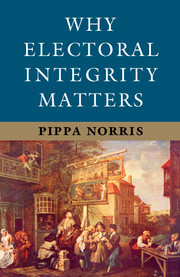Book contents
- Frontmatter
- Contents
- List of Figures
- List of Tables
- Preface and Acknowledgments
- Part I Introduction
- Part II The Problem of Flawed Elections
- Part III The Consequences of Electoral Integrity
- 6 For Legitimacy
- 7 For Political Behavior
- 8 For Conflict and Security
- 9 For Regimes
- Part IV Conclusions
- Technical Appendix A: Description of Variables and Scale Construction
- Technical Appendix B: Questions in the Expert Survey of Perceptions of Electoral Integrity
- Technical Appendix C: Electoral Context and Background in the Selected Cases
- Notes
- Select Bibliography
- Index
7 - For Political Behavior
Published online by Cambridge University Press: 05 July 2014
- Frontmatter
- Contents
- List of Figures
- List of Tables
- Preface and Acknowledgments
- Part I Introduction
- Part II The Problem of Flawed Elections
- Part III The Consequences of Electoral Integrity
- 6 For Legitimacy
- 7 For Political Behavior
- 8 For Conflict and Security
- 9 For Regimes
- Part IV Conclusions
- Technical Appendix A: Description of Variables and Scale Construction
- Technical Appendix B: Questions in the Expert Survey of Perceptions of Electoral Integrity
- Technical Appendix C: Electoral Context and Background in the Selected Cases
- Notes
- Select Bibliography
- Index
Summary
Legitimacy includes both attitudinal and behavioral components. The third proposition in the core theory claims that perceptions of election integrity will affect political participation, with lack of confidence depressing voter turnout and also simultaneously strengthening the propensity for ordinary people to engage in peaceful demonstrations and violent protests. The model depicted earlier in Figure 1.1 also suggests an indirect effect of perceptions on behavior, which is mediated by feelings of political legitimacy. The reasoning is straightforward. Where an election is widely regarded as rigged, corrupt, or unfair, this is likely to depress conventional forms of electoral participation, especially voting turnout among supporters of the losing side. Why spend time following the campaign, becoming informed about party choices, discussing politics, helping parties and candidates, attending rallies, and then trudging to the polls (especially if facing threats of political violence) if the exercise is ultimately futile for dislodging incumbents? After all, confidence that the political system is responsive to citizens’ concerns (otherwise known as “external political efficacy”) has long been established as strongly associated with political participation. The assumption of a link rests on classical Downsian theories of rational voters calculating the utility benefits of going to the polls by the outcome for party choice. In this model, citizens estimate the costs and benefits of voting, and the probability of their vote making a difference to the outcome. The latter is normally assumed to be calculated based on the closeness of the race; in marginal seats, where even a small swing of the vote can determine the winner, the incentive to vote is higher. But electoral integrity can also be regarded as part of the calculation. In elections where contests are procedurally fair, citizens can be confident that their ballots will count and that candidates and parties compete on a level playing field. When it is widely believed that systematic fraud or abuse depresses competition, however, the outcome may be regarded as a foregone conclusion. Any effects that arise can also be expected to differ for electoral winners and losers, as established in Chapter 6 for feelings of legitimacy.
- Type
- Chapter
- Information
- Why Electoral Integrity Matters , pp. 133 - 144Publisher: Cambridge University PressPrint publication year: 2014

